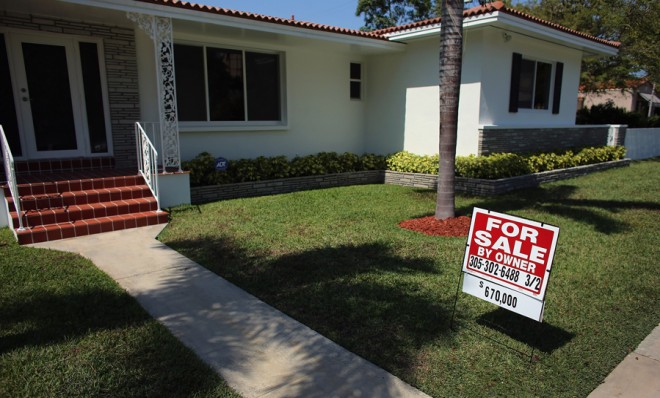Why we shouldn't get too excited about spiking home prices
Home values are on the rise. But it's still way too soon to throw a party.

A free daily email with the biggest news stories of the day – and the best features from TheWeek.com
You are now subscribed
Your newsletter sign-up was successful
The Department of Commerce just released news that has some economists doling out gold stars to the housing market.
Residential home prices shot up in February by the largest year-over-year margin since May 2006 — which many analysts see as another strong indication of broader economic recovery. The S&P Case-Shiller Index of 20 U.S. cities shows a 9.3 percent rise in home prices from February 2012 to February 2013, and a 1.2 percent rise on a seasonally adjusted basis just from this January to February, topping forecasts for both figures.
There's certainly reason for optimism. "Rising home prices are good for the economy," Harm Bandholz, chief U.S. economist at UniCredit Group in New York, told Bloomberg. "This affects a good part of the U.S. population, allowing them to borrow against their houses and enabling some who have been underwater to refinance. That's very important."
The Week
Escape your echo chamber. Get the facts behind the news, plus analysis from multiple perspectives.

Sign up for The Week's Free Newsletters
From our morning news briefing to a weekly Good News Newsletter, get the best of The Week delivered directly to your inbox.
From our morning news briefing to a weekly Good News Newsletter, get the best of The Week delivered directly to your inbox.
Indeed, these days, the housing market might look like a good place for both buyers and sellers. Mortgage rates are near all-time lows, which spurs demand and makes borrowing more affordable for potential buyers. And home price gains (partly propelled by low inventory) make the market a much friendlier place to sell.
Still, some analysts caution that we ought to hold off on celebrating too much, at least for now. While these latest numbers look good, home prices are still down 28 percent from their peak in 2006, says CNN. They're even down from 2008, when the market was still cratering.
And what looks like good news for the 20 cities in the Case-Shiller index may not be particularly relevant for everyone else. As the Washington Post notes:
Stan Humphries, chief economist at Zillow, a real estate data provider, cautioned that the national figures are being skewed by sharp rebounds in cities hit hard during the housing bust, including Las Vegas and Phoenix. Investors are helping drive up prices in those cities.
"This report needs to start being taken with a grain of salt, Humphries said. "The appreciation rates we're currently seeing ... are not broadly reflective of what's happening in the national housing market right now." [Washington Post]
Plus, short-term bumps don't always equate to long-term gains. A couple weeks ago, Robert Shiller (of the Case-Shiller index) had this to say in a New York Times column titled "The Housing Haze":
A free daily email with the biggest news stories of the day – and the best features from TheWeek.com
There has been some good news lately: home prices have risen over the last year, and with those gains there has been a renewed sense of optimism. But do these price increases mean that homes are now good investments for the long haul?
Unfortunately, no. We do know one thing from economic research: one-year home price increases, after correcting for inflation, have had almost no statistical relationship to increases 10 years down the road. Thus, the upturn last year is irrelevant to long-run forecasting. Booms are typically followed by busts, usually in far less than 10 years. In a decade, an entire housing boom, if there is one in inflation-corrected terms, is likely to have been reversed and completely washed away. [New York Times]
So... the housing market may not have earned those gold stars just yet. Perhaps a "most improved" certificate would be a better choice.
Carmel Lobello is the business editor at TheWeek.com. Previously, she was an editor at DeathandTaxesMag.com.
-
 Mixing up mixology: The year ahead in cocktail and bar trends
Mixing up mixology: The year ahead in cocktail and bar trendsthe week recommends It’s hojicha vs. matcha, plus a whole lot more
-
 Labor secretary’s husband barred amid assault probe
Labor secretary’s husband barred amid assault probeSpeed Read Shawn DeRemer, the husband of Labor Secretary Lori Chavez-DeRemer, has been accused of sexual assault
-
 Trump touts pledges at 1st Board of Peace meeting
Trump touts pledges at 1st Board of Peace meetingSpeed Read At the inaugural meeting, the president announced nine countries have agreed to pledge a combined $7 billion for a Gaza relief package